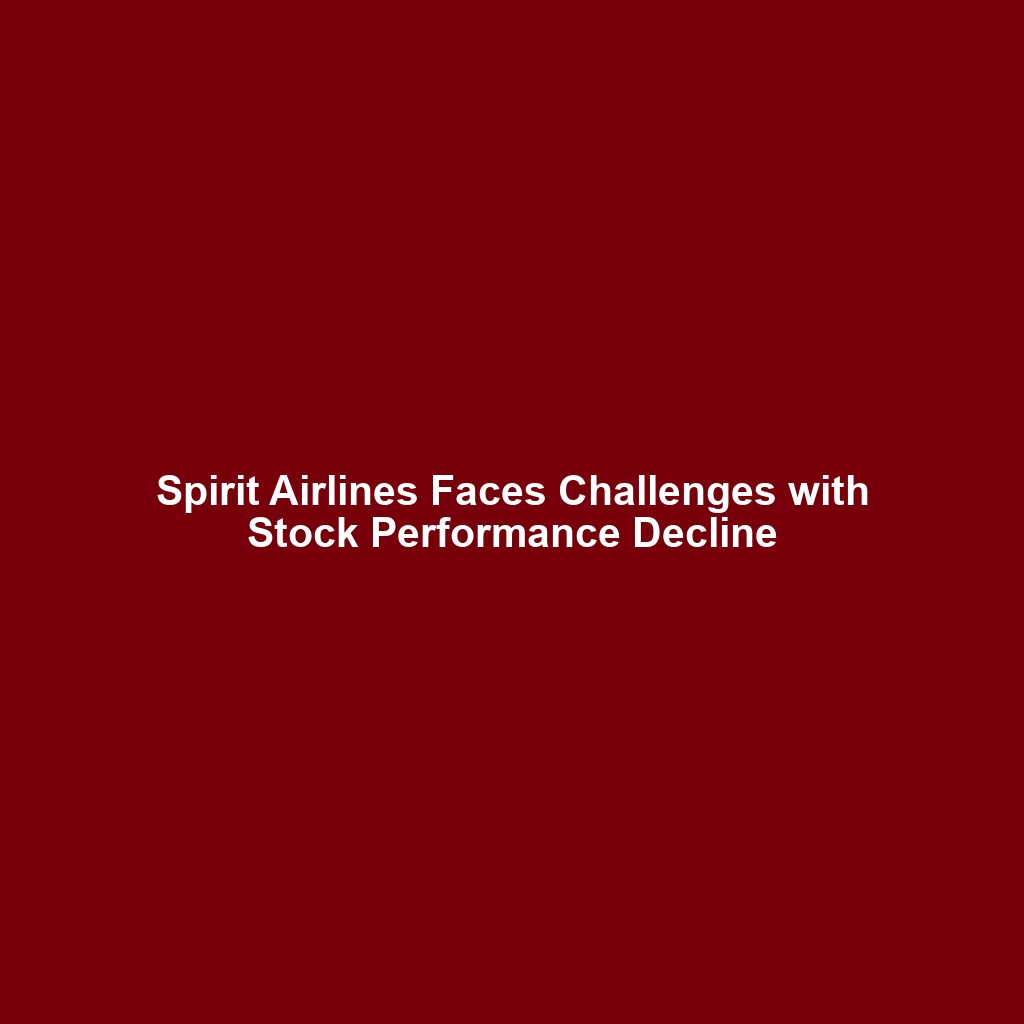Your cart is currently empty!
Tag: Travel Trends

Spirit Airlines Faces Challenges with Stock Performance Decline
Spirit Airlines Faces Challenges with Stock Performance Decline
Spirit Airlines Faces Challenges with Stock Performance Decline
Spirit Airlines, known for its low-cost ticket offerings, is currently grappling with a downturn in stock performance that raises questions about its future. As of October 2023, the company’s stock has declined over 20% in the past year, reflecting broader challenges facing the airline industry and specific operational hurdles within the company itself. This article explores the multifaceted factors contributing to Spirit’s stock performance and examines what this could mean for the airline going forward.
Market Overview and Recent Performance
Spirit Airlines’ stock performance has mirrored the volatility seen throughout the air travel sector, which has faced significant headwinds since the pandemic. According to market analysts, ongoing challenges such as rising fuel costs, inflationary pressures, and fluctuating demand have all played a role in the decline.
For instance, data from financial analysis firms point to a sector-wide increase in operational costs. Spirit, primarily a low-cost carrier, relies heavily on maintaining lower fares to attract price-sensitive travelers. However, increases in fuel prices, which currently show no signs of stabilizing, have prompted analysts to reevaluate profitability across the airline sector.
Impact of Rising Operational Costs
Fuel costs represent the most significant expense for airlines, and with crude oil prices hovering around $80 per barrel, Spirit Airlines is feeling the pinch. Rising operational costs not only erode profit margins but also compel the airline to adjust its pricing strategy, potentially alienating its core customer base.
“It’s crucial for airlines like Spirit to strike a balance between maintaining competitive fares while also covering their rising costs. Failure to do so could lead to long-term viability issues,” commented aviation analyst David Lutz.
Challenges with Operational Efficiency
Aside from fluctuating fuel prices, Spirit Airlines has faced specific operational hurdles that have raised concerns about its future. The airline’s performance has been marred by a series of flight cancellations and staffing shortages, a dilemma that first became evident during the summer travel surge.
Flight cancellations have reached significant levels, with reports indicating that the airline canceled nearly 7% of its flights in Q3 of 2023, resulting in a loss of consumer confidence. Moreover, staffing shortages have been reported as pilots and crew members have left for better-paying positions within the industry.
Consumer Demand and Travel Trends
On the demand front, Spirit Airlines has also encountered headwinds. While air travel demand has rebounded following the pandemic, economic indicators suggest that consumer spending is beginning to decline. This could lead to a downturn in discretionary travel spending, which impacts demand for low-cost carriers that thrive on affordability.
“As inflation continues to rise, consumers are expected to be more cautious with their spending habits. This shift could adversely affect airlines that cater to budget travelers,” noted economic strategist Sarah Hanley.
Industry Competition and Market Positioning
The competitive landscape has also intensified as airlines rapidly adapt to changing consumer preferences and try to regain lost market share. Major carriers such as Southwest and American Airlines are improving their service offerings, making it imperative for Spirit Airlines to not only compete on price but also on service quality.
Spirit’s unique positioning as an ultra-low-cost carrier gives it a competitive advantage, but it must navigate the challenges posed by larger airlines that are enhancing their offerings. “The ultra-low-cost model is sustainable, but it requires constant adaptation to market changes. Spirit needs to be cautious about how it positions itself in a growing competitive environment,” advised airline consultant James Tarlow.
Future Outlook: What Lies Ahead?
Looking ahead, the future of Spirit Airlines hinges on its ability to manage costs effectively while maintaining passenger satisfaction. The organization has undertaken various strategic initiatives, including expanding its route network and investing in marketing efforts to attract new customers. However, these steps must offset the operational challenges it currently faces.
Furthermore, Spirit Airlines is also exploring options for fleet modernization, which could improve fuel efficiency and operational reliability, although such improvements require substantial financial investment during a time of economic uncertainty.
Conclusion
Spirit Airlines is undoubtedly facing a challenging landscape, characterized by rising operational costs, intense competition, and shifts in consumer demand. With its stock performance reflecting these concerns, stakeholders are eager to observe how the airline navigates its current difficulties. Moving forward, Spirit’s strategies will be crucial in determining not only its stock recovery but also its reputation and viability within the broader airline industry.
As the airline continues to adapt to the changing economic environment, analysts will be closely monitoring its financial health and operational adjustments for signs of recovery and growth potential.

Hotels Embrace Sustainable Practices to Attract Eco-Conscious Travelers
Hotels Embrace Sustainable Practices to Attract Eco-Conscious Travelers
Hotels Embrace Sustainable Practices to Attract Eco-Conscious Travelers
As environmental awareness continues to grow among consumers, hotels around the globe are increasingly adopting sustainable practices to appeal to eco-conscious travelers. The international hotel industry is witnessing a shift as guests seek accommodations that align with their values, prompting many establishments to rethink operations and implement green initiatives.
Growing Demand for Eco-Friendly Accommodations
A 2022 report from Booking.com highlighted that 81% of global travelers expressed a desire to stay in eco-friendly accommodations, signalling a significant shift in consumer preferences. This demand mirrors a broader trend where sustainability is becoming a critical factor in travel decisions.
According to Hilton Hotels’ recent sustainability initiative, their 2030 goals focus on reducing environmental impact and promoting greener practices in hospitality. “Travelers want to know that their stay will contribute to a better world,” said Julie Cottineau, a branding expert. “Hotels that ignore this shift risk losing out on a vital segment of the market.”
Key Trends in Sustainable Practices
Several trends have emerged as hotels implement eco-friendly practices. From energy conservation to waste reduction, these strategies are gaining traction:
1. Energy Efficiency Initiatives
Many hotels are investing in energy-efficient infrastructure, such as LED lighting, solar panels, and high-efficiency heating and cooling systems. The Marriott International chain, for example, aims to reduce its carbon footprint by 30% by 2025, utilizing technologies that minimize energy use.
2. Water Conservation Measures
Water usage is another focus area. Properties are adopting low-flow fixtures and recycling wastewater for landscaping. As part of its sustainability program, the Accor group has implemented extensive water-saving measures, claiming to have reduced water consumption by 20% in recent years.
3. Waste Reduction Efforts
Sustainable waste management is critical for eco-conscious hotels. Many establishments are moving towards eliminating single-use plastics, with some now providing refillable toiletries and opting for bulk items instead. Hyatt Hotels has initiated a “Waste Not” program in which they have committed to diverting 50% of waste from landfills by 2025.
4. Sourcing Local and Organic Products
To support local economies and reduce their carbon footprint, hotels are increasingly sourcing food and products locally. The Farm-to-Table initiative is being embraced by various restaurants within hotel properties, ensuring meals are made from fresh, locally-grown ingredients. Four Seasons Hotels have reported enhanced guest satisfaction scores when serving local cuisine.
The Role of Certifications in Establishing Credibility
Certifications play a significant role in identifying sustainable hotels. Organizations such as Green Key, LEED (Leadership in Energy and Environmental Design), and EarthCheck provide guidelines and accreditation for hotels demonstrating a commitment to sustainability. These labels serve as important markers for travelers seeking green accommodations.
Marriott International has achieved the Green Key certification for over 700 of its hotels, providing guests with reassurance regarding their eco-friendly practices. “Certifications not only enhance credibility; they also create a competitive advantage,” noted Greg Smith, an environmental consultant.
Challenges in Implementing Sustainable Practices
Despite the benefits of adopting green initiatives, hotels face several challenges. Initial costs associated with upgrading systems and obtaining certifications can be significant barriers for smaller establishments. Moreover, ongoing maintenance and staff training are essential to ensure sustainable practices become ingrained in daily operations.
Additionally, not all guests may be receptive to sustainability measures. Some express concern that green practices could compromise luxury or convenience. Effective communication regarding the benefits of sustainability to both guests and employees is crucial for overcoming these challenges.
The Future of Sustainable Hospitality
As the hospitality industry evolves, it appears clear that sustainable practices are no longer optional. Major hotel chains and independent establishments alike need to embrace these changes to remain relevant in a competitive market. Analysts predict that hotels that adopt comprehensive sustainability strategies will outperform their peers in the coming decade.
According to a 2023 study published by Cornell University, hotels that invest in sustainability not only enhance guest experiences but also improve financial performance. “The future of travel will prioritize sustainability,” said Dr. Rohit Verma, co-author of the study. “Hotels must not only meet guest expectations but also lead the charge for environmental stewardship.”
Conclusion
In conclusion, the move towards sustainable hospitality practices is transforming the hotel industry, as eco-conscious travelers increasingly seek out accommodations that reflect their values. From energy efficiency and water conservation to waste reduction and locally-sourced products, hotels are adopting innovative strategies to create a more sustainable future. By aligning their offerings with the desires of today’s eco-friendly guests, the hospitality sector is poised to not only survive but thrive in an environmentally conscious world.
For travelers, this shift presents an opportunity to support businesses committed to sustainability. The next time you book a stay, consider choosing an eco-friendly hotel that shares your environmental values for a more responsible travel experience.

Expedia Group, Inc. (EXPE)
Summary
Expedia Group, Inc. (NASDAQ: EXPE) is a leading global online travel company that offers a diverse range of travel-related services. Founded in 1996, the company operates multiple travel booking sites, including Expedia.com, Hotels.com, and Vrbo, catering to various travel needs such as accommodation, flights, car rentals, and vacation packages. With a strong presence in North America and Europe, Expedia aims to simplify the travel experience by leveraging technology to help consumers easily plan and book their trips.
News
Recent developments at Expedia Group, Inc. highlight its continued recovery post-pandemic, with an increase in travel demand boosting revenue. In the latest earnings report, the company announced a robust growth in bookings, surpassing pre-COVID levels. Additionally, Expedia is investing in technology and marketing initiatives to enhance user experience and expand its reach in emerging markets. Analysts suggest that the ongoing trend of remote work will further support travel service growth, as more individuals seek flexible travel options.
Research
Research indicates that Expedia Group holds a strong competitive position in the online travel market. Its diverse portfolio of travel brands allows for cross-selling opportunities and customer retention. Market analysts are optimistic about the company’s future earnings potential, given its strategic partnerships and emphasis on customer service. Furthermore, Expedia’s utilization of big data and AI tools aids in personalizing travel offers, thus driving higher conversion rates.
Charts
Historical stock performance charts show fluctuations in Expedia’s share price, reflecting the company’s resilience during economic downturns. Recent trends reveal a positive trajectory, with the stock price increasing as consumer travel continues to rebound. Key technical indicators suggest that EXPE could maintain its bullish momentum in the coming quarters if current travel demand persists.
Community
The Expedia community comprises millions of customers worldwide, including travel enthusiasts, families, and business travelers. The company engages with its community through various channels, including social media, forums, and user feedback portals, fostering a culture of loyalty and engagement. Customer reviews and ratings play a significant role in enhancing the credibility of the services offered by the company.
Statistics
- Market Cap: 19 billion,
- P/E Ratio: 22.35,
- Dividend Yield: 0.00%,
- 52-Week Range: 81.45 – 132.18,
- Average Volume: 2.5 million shares
Financials
- Revenue: 11.5 billion,
- Net Income: 1.2 billion,
- Cash Flow: 1.5 billion
Historical Data
Expedia’s historical data demonstrates a consistent growth trajectory since its inception. Following the global pandemic, the company’s rebound has been significant, with improved quarterly earnings and enhanced customer loyalty. This data points to a strong recovery phase, indicating good prospects for long-term profitability.
Profile
Expedia Group, Inc. is headquartered in Seattle, Washington. The company operates through various segments, including Retail, B2B, and Vacation Rental Services. Its mission is to power global travel for everyone, everywhere by providing the best possible experience to its users while maintaining sustainability and corporate responsibility as core values.
Analysis
Analysts regard Expedia Group as well-positioned to capitalize on growing travel demand, particularly in vacation rentals and leisure travel. The company’s investments in technology and marketing are expected to yield significant returns as they increase market capture rates. Furthermore, partnerships with airlines and hotels enhance Expedia’s competitive edge, allowing for a comprehensive travel solution.
Options
The options market for Expedia Group reflects growing investor confidence, with a notable increase in call options being exercised. This trend indicates bullish sentiment among traders, who anticipate further price appreciation in the stock amidst rising travel demand and robust financial performance.
Holders
Expedia Group’s ownership structure features a diverse group of institutional investors who play a crucial role in the company€„¢s governance and strategic direction. Shareholder engagement remains crucial, with efforts in place to communicate effectively with stakeholders regarding company performance and future growth strategies.
Sustainability
Expedia Group is committed to sustainability and responsible travel. The company has implemented initiatives aimed at reducing its carbon footprint and supporting eco-friendly travel options. By collaborating with various partners, Expedia aims to promote sustainable practices among travelers and service providers alike.
Key Executives
Top Institutional Holders
- Vanguard Group,
- BlackRock,
- Fidelity
For up-to-date financial news and expert insights, visit UpCubeMoney.com.